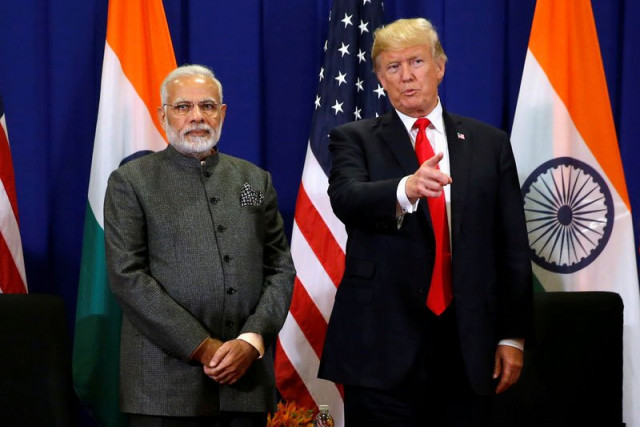US plans to scrap preferential trade treatment for India
President Donald Trump looks set to open a new front in his trade wars with the South Asian nation

US President Donald Trump holds a bilateral meeting with India's Prime Minister Narendra Modi alongside the ASEAN Summit in Manila, Philippines November 13, 2017. PHOTO: REUTERS
Trump, who has vowed to cut US trade deficits, has repeatedly called out India for its high tariffs, and US trade officials said scrapping the concessions would take at least 60 days after notifications to Congress and the Indian government.
US, China could reach trade deal at summit around March 27
“I am taking this step because, after the intensive engagement between the United States and the government of India, I have determined that India has not assured the US that it will provide equitable and reasonable access to the markets of India,” Trump said in a letter to congressional leaders.
India is the world’s largest beneficiary of the Generalised System of Preferences (GSP) programme and ending its participation would be the strongest punitive action for the South Asian nation since Trump took office in 2017.
The US Trade Representative’s Office said removing India from the GSP programme would not take effect for at least 60 days after the notifications, and would be done through a presidential proclamation.
The preferential trade treatment brings “actual benefit” of just $250 million a year to India, however, a government source said in the capital, New Delhi, adding that it hoped the planned withdrawal would not lead to trade hurdles.
“GSP is more symbolic of the strategic relationship, not in value terms,” added the source, who declined to be identified ahead of a news briefing by the Indian trade ministry.
It was not immediately clear what retaliatory action authorities in India, which is due to hold general elections this year, would take.
Trade ties with the US were hurt after India unveiled new rules on e-commerce limiting the way internet retail giants Amazon.com Inc and Walmart Inc-backed Flipkart do business.
The e-commerce rules followed a drive by New Delhi to force global card payments companies such as Mastercard Inc and Visa Inc to move their data to India and higher tariffs on electronic products and smartphones.
Trump delays tariff hike on Chinese goods as trade talks progress
“India has implemented a wide array of trade barriers that create serious negative effects on United States commerce,” the USTR said.
“Despite intensive engagement, India has failed to take the necessary steps to meet the GSP criterion.”
India’s top GSP exports to the United States in 2017 included motor vehicle parts, ferro alloys, precious metal jewellery, building stone, insulated cables and wires, said business grouping the Confederation of Indian Industry, which had lobbied against the withdrawal of preferential treatment.



















COMMENTS
Comments are moderated and generally will be posted if they are on-topic and not abusive.
For more information, please see our Comments FAQ